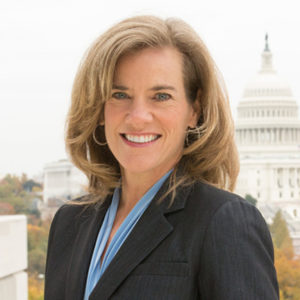A divided U.S. Supreme Court sidestepped a decision about whether the Constitution permits bakers, florists and other business owners with religious objections to same-sex marriage to refuse commercial wedding services to gay couples in a June 4 ruling siding with a Colorado baker.
The 7-2 verdict stopped short of establishing as a matter of law that a business owner’s moral beliefs trump nondiscrimination laws when it comes to LGBTQ people and same-sex couples, the hoped-for outcome by the Religious Right.
Instead, the majority ruled more narrowly that state officials showed “elements of a clear and impermissible hostility toward the sincere religious beliefs” held by Jack Phillips, the owner of Masterpiece Cakeshop punished by the Colorado Civil Rights Commission’s for declining to create a custom cake for a same-sex wedding.

Holly Hollman
“Rather than determining whether the business owner’s refusal to provide a service violated the law, the Court decided today’s case based on the actions of the administrative body charged with enforcing the law,” said Holly Hollman, general counsel of the Baptist Joint Committee for Religious Liberty.
The majority opinion by Justice Anthony Kennedy — who also wrote the 2015 Supreme Court decision legalizing same-sex marriage in the U.S. – said state law can protect gay persons from discrimination in acquiring products and services offered to other members of the public, but in this case statements by commissioners “cast doubt on the fairness and impartiality” of the process.
Kennedy said commissioners made statements in public hearings endorsing “the view that religious beliefs cannot legitimately be carried into the public sphere or commercial domain, implying that religious beliefs and persons are less than fully welcome in Colorado’s business community.”
One commissioner, he noted, suggested that Phillips can believe “what he wants to believe” but cannot act on his religious beliefs “if he decides to do business in the state.”
“Standing alone, these statements are susceptible of different interpretations,” Justice Kennedy wrote. “On the one hand, they might mean simply that a business cannot refuse to provide services based on sexual orientation, regardless of the proprietor’s personal views. On the other hand, they might be seen as inappropriate and dismissive comments showing lack of due consideration for Phillips’ free exercise rights and the dilemma he faced. In view of the comments that followed, the latter seems the more likely.”
The decision said future disputes pitting religious liberty against LGBTQ rights “must be resolved with tolerance, without undue disrespect to sincere religious beliefs, and without subjecting gay persons to indignities when they seek goods and services in an open market.”
The Baptist Joint Committee for Religious Liberty filed a friend-of-the-court brief last October arguing that a commercial bakery should not be able to refuse service to a same-sex couple based on the baker’s sincerely held religious belief about marriage.
“Religious liberty protects beliefs and actions related to marriage,” Hollman said in light of Monday’s decision. “It does not mean that religious beliefs provide blanket exemptions to nondiscrimination laws that protect our neighbors.”
At the same time, she said, “Religious objectors, like all Americans, have the right to be treated with respect and not to have their religious beliefs denigrated.”
The Ethics and Religious Liberty Commission of the Southern Baptist Convention filed an opposing brief suggesting that non-discrimination laws force cake artists like Phillips to choose between earning a living or exercising their faith.
ERLC head Russell Moore said the Supreme Court got the decision right in comments published by Baptist Press.
“I have long been concerned by the erosion of religious liberty and the characterizing of some of the most basic religious convictions of millions of Americans as hateful or bigoted,” Moore said. “So I was very glad to see the strong rebuke of hostility toward religious people’s viewpoints.”
The case, Masterpiece Cakeshop, Ltd. v. Colorado Civil Rights Commission was one of the most closely watched on the Supreme Court’s docket this term. Civil liberties advocates called it a major test of the Religious Right’s effort to curtail LGBTQ rights under the guise of religious freedom.
Similar cases, such as one involving a Washington state florist found guilty of unlawful discrimination when she refused to decorate a same-sex wedding ceremony, are in the court system headed toward possible Supreme Court review.
Previous stories:
Baptists, others faith groups say religious liberty not a license to discriminate
